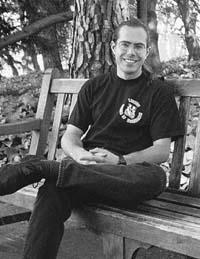Alexander to teach at London School of Economics
Open gallery

As strange as it sounds, British citizens who don’t pay 100 pounds (about $140) to register their home television sets risk paying a fine 10 times that amount and spending some time behind bars.
Jason Alexander ’95 knows this because he’s moving to England this summer to become a tenure-track lecturer with the esteemed London School of Economics and Political Science. There, in the school’s Department of Philosophy, Logic and Scientific Method, Alexander will continue his heralded research into the evolution of norms.
Given his academic pursuits, it’s only natural to hear Alexander wax philosophical about England’s quirky television-licensing requirement. At one time, customs in the United States and England were similar, but with the passage of time, “you would expect some divergence in community standards and norms.”
It is precisely this line of inquiry that has landed Alexander a plum position at a school internationally known for its work in his special field of study.
Alexander’s research applies a facet of mathematics (i.e., game theory) to an area of philosophy (i.e., the evolution of societal values).
“I had an interest in approaching philosophical problems using computational modeling and mathematical analysis,” says Alexander.
“It turned out that that particular area—evolutionary game theory—was the natural intersection of my interests.”
Alexander dates his fascination with mathematical philosophy to a single night during high school when his local public television station in Alaska aired a “NOVA” episode on the mysteries of mathematics.
When it came time to attend college, Alexander chose to pursue his academic interest in an intimate, liberal arts setting.
“Going to a liberal arts school gave me the opportunity to branch out,” says Alexander, who won a full-tuition Barbara Hirschi Neely Scholarship to attend Lewis & Clark College.
“It certainly helped me become more well-rounded in my education.”
At Lewis & Clark, Alexander quickly distinguished himself both inside and outside the classroom.
As a sophomore, he won a Barry M. Goldwater Scholarship, the premier undergraduate award for students who are pursuing mathematics, science or engineering careers. As a junior, he was among the first crop of students who were inducted into the Dr. Robert B. Pamplin, Jr., Society of Fellows. He served as vice president of the Student Academic Affairs Board and mentored at-risk students at a north Portland middle school.
“I loved my time at Lewis & Clark,” Alexander says. “I really enjoyed the classes and that the faculty were accessible.”
Faculty members were impressed by Alexander’s deep intellectual curiosity, by his command of the theoretical, and by his ability to integrate the fields of mathematics and philosophy.
“He is brilliant,” says Harvey Schmidt, professor of mathematics and Alexander’s former adviser. “He was intrigued by new approaches to things and was inspired to understand the most complex theoretical problems.”
A prime example of Jason’s intellectual ambition was his senior honors thesis on the logical foundations of mathematics, an area that confounds most scholars.
“It’s not the sort of thing someone tries to teach at the undergraduate level,” says John Krussel, associate professor of mathematics.
According to Alexander, his research into the philosophical foundations of mathematics “raised interesting questions,” so he decided to pursue graduate-level work in philosophy rather than mathematics.
Five years later, he had earned a doctorate in philosophy from the University of California at Irvine and has become a regular presenter at national and international scholarly conferences.
In fact, Alexander presented his paper, titled “Lattice Models of the Nash and Ultimatum Game,” directly following a presentation by Nobel laureate Herb Simon. The occasion was a conference on Computing and Philosophy at Carnegie-Mellon University that attracted scholars from throughout the world.
Now, after a one-year lectureship at the University of California at San Diego, Alexander moves to a school that is internationally known as “an extremely important place for philosophers of science,” notes William Rottschaefer, professor of philosophy. Indeed, the Philosophical Gourmet Report, a Web site that ranks graduate-level philosophy programs, trumpeted Alexander’s appointment by declaring that he will join “one of the strongest groups in the world in his fields.”
Alexander says, once in London, he and wife Carrie will definitely register their television set—once they find a permanent place to live in a city with a housing market tighter than Silicon Valley’s.
He’s certain he’ll discover additional differences in custom, but for now, he is overjoyed about an important similarity. When interviewing for his new post, school officials told Alexander that they were looking for someone who does exactly what he does.
“I think it’s going to be a fantastic opportunity and a tremendous experience,” he says.
—by Dan Sadowsky
More L&C Magazine Stories
Lewis & Clark Magazine is located in McAfee on the Undergraduate Campus.
MSC: 19
email magazine@lclark.edu
voice 503-768-7970
fax 503-768-7969
The L&C Magazine staff welcomes letters and emails from readers about topics covered in the magazine. Correspondence must include your name and location and may be edited.
Lewis & Clark Magazine
Lewis & Clark
615 S. Palatine Hill Road MSC 19
Portland OR 97219

